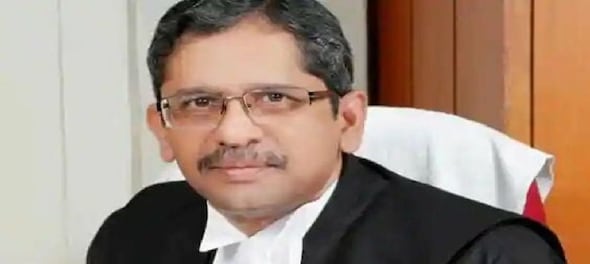
As Chief Justice of India NV Ramana retires tomorrow, the Supreme Court heard a number of important matters on Thursday, including pleas challenging the recent release of the 11 convicts in the Bilkis Bano case and the Pegasus spyware matter. Another petition related to the security lapses in Punjab during Prime Minister Narendra Modi’s visit in January this year is also listed for hearing.
In the Pegasus case, the SC-appointed technical committee found malware in only 5 of the 29 phones examined, the bench headed by CJI Ramana said on Thursday. He also observed that the government had not cooperated with the committee and had adopted the same stand in the panel’s proceedings that it had taken before the SC.
In the Bilkis Bano case, the Supreme Court asked the Gujarat government to respond to the plea challenging the release of the 11 convicts. The bench headed by CJI Ramana asked the petitioners to implead those who have been granted remission as parties in the matter. The bench will hear the case after two weeks.
ALSO READ:
Justice Ramana succeeded Justice SA Bobde as the 48th Chief Justice of India on April 24, 2021. Born in an agrarian family on August 27, 1957, in Andhra Pradesh, Justice Nuthalapati Venkata Ramana enrolled as an advocate on February 10, 1983. He became a permanent judge of the Andhra Pradesh High Court on June 27, 2000. Justice Ramana served as the acting Chief Justice of the Andhra Pradesh High Court between March 10 and May 20, 2013. The same year, he was elevated as the Chief Justice of the Delhi High Court and in 2014 he became a judge at the Supreme Court.
After serving an eight-year term in the Supreme Court, CJI Ramana is set to retire on August 26. During his tenure at the top court, he has been part of 657 benches and authored 174 judgements.
Here’s a look at some of the notable judgements CJI Ramana has been part of.
In January 2021, then Justice Ramana and Justice Surya Kant ruled that the value of a woman’s work at home was nothing less than that of her husband working in an office. The idea had earlier been espoused by the Supreme Court in the Lata Wadhwa case in 2001.
ALSO READ: 'A serious economic issue' — SC suggests forming apex body to control freebies during elections
In the 2020 Md. Anwar Vs. State of NCT of Delhi case, a three-judge bench with Justice Ramana ruled that to successfully claim defence of mental unsoundness in court, the accused would have to show that they suffered from a serious mental disease or infirmity that affected his/ her ability to distinguish right from wrong.
“Mere production of photocopy of an OPD card and statement of mother on affidavit have little, if any, evidentiary value,” the bench had held.
In the case between Central Public Information Officer and Subhash Chandra Agarwal in 2019, a five-judge constitution bench, including Justice Ramana, held that the office of the Chief Justice of India falls under the purview of the Right to Information Act, 2005 as it was a public authority as defined in the Act. The judgment made information on SC Judges and their assets publicly available.
In the Anuradha Bhasin Vs Union of India case in 2019 related to the Internet shutdown in Kashmir that year, a three-judge bench said the Internet could not be suspended for an indefinite period and that the right to trade over the Internet was a fundamental right.
In the Nabam Rebia and Bamang Felix Vs deputy speaker case of 2016, a five-judge constitutional bench comprising Justices NV Ramana, Jagdish Singh Khehar, Madan B. Lokur, Dipak Misra and Pinaki Chandra Ghose held that the powers of the governor were not absolute. The bench said the speaker could not disqualify a member of the Assembly when a motion of removal is pending against him.
(Edited by : Sudarsanan Mani)
Check out our in-depth Market Coverage, Business News & get real-time Stock Market Updates on CNBC-TV18. Also, Watch our channels CNBC-TV18, CNBC Awaaz and CNBC Bajar Live on-the-go!


BJP is planning to ban RSS, says Shiv Sena (UBT) chief Uddhav Thackeray
May 18, 2024 8:01 PM
Punjab Lok Sabha elections: Complete list of Congress candidates
May 18, 2024 4:08 PM
Punjab Lok Sabha elections: Check full list of AAP candidates and constituencies
May 18, 2024 12:59 PM
PM Modi, Rahul Gandhi election rallies in Delhi today: Here are the routes to avoid
May 18, 2024 11:28 AM

